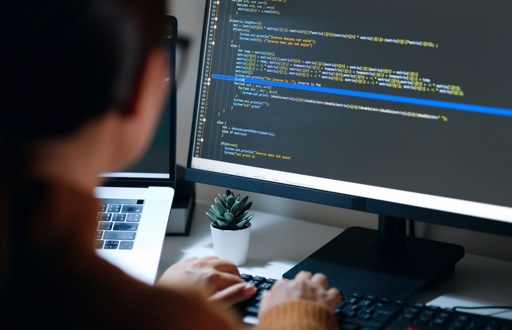The effects of AI on firms and workers
-
The past decade has seen tremendous growth in commercial investments in artificial intelligence (AI). The first wave came after the 2012 ImageNet challenge, which was a pivotal moment in the history of artificial intelligence, particularly computer vision and deep learning. Then, advances in computing power—GPU hardware—powered neural network models trained on large amounts of data. Across industries, from construction to pharmaceuticals to finance, companies rushed to implement AI in their operations. This trend has only accelerated with the release of OpenAI’s ChatGPT in late 2022. Even larger models trained on even larger datasets are showing even greater power, and AI applications are becoming ubiquitous across U.S. businesses (Babina, et al. 2024).
The rapid rise of commercial AI has inevitably brought concerns regarding its potential to displace human workers. There is evidence that AI can automate some cognitive tasks or increase worker productivity in a way that could reduce the number of workers needed. For example, Brynjolfsson, et al. (2025) find that AI tools make customer service workers much more efficient. Fedyk, et al. (2022) find that audit firms that use AI reduce their audit workforce. But the good news is that the labor-displacing effects seem confined to select sectors and occupations. On aggregate, recent academic research finds evidence that companies’ use of AI has been accompanied by an increase in the workforce.
This article synthesizes recent research—including new findings from Babina, et al. (2024) and Babina, et al. (2023)—to assess the real-world impacts of AI on firms and workers. Contrary to common fears, we find that AI has so far not led to widespread job loss. Instead, AI adoption is associated with firm growth, increased employment, and heightened innovation, particularly in product development. However, the effects are not uniformly distributed: AI-investing firms increasingly seek more educated and technically skilled employees, alter their internal hierarchies, and contribute to rising industry concentration. These trends carry important implications for public policy, including workforce development, education and reskilling initiatives, and antitrust enforcement. This article reviews the evidence and highlights key takeaways for policymakers navigating the AI-driven economy.

The effects of AI on firms and workers | Brookings
Synthesis of new research assessing the real-world impacts of artificial intelligence on firms and workers.

Brookings (www.brookings.edu)
-
The past decade has seen tremendous growth in commercial investments in artificial intelligence (AI). The first wave came after the 2012 ImageNet challenge, which was a pivotal moment in the history of artificial intelligence, particularly computer vision and deep learning. Then, advances in computing power—GPU hardware—powered neural network models trained on large amounts of data. Across industries, from construction to pharmaceuticals to finance, companies rushed to implement AI in their operations. This trend has only accelerated with the release of OpenAI’s ChatGPT in late 2022. Even larger models trained on even larger datasets are showing even greater power, and AI applications are becoming ubiquitous across U.S. businesses (Babina, et al. 2024).
The rapid rise of commercial AI has inevitably brought concerns regarding its potential to displace human workers. There is evidence that AI can automate some cognitive tasks or increase worker productivity in a way that could reduce the number of workers needed. For example, Brynjolfsson, et al. (2025) find that AI tools make customer service workers much more efficient. Fedyk, et al. (2022) find that audit firms that use AI reduce their audit workforce. But the good news is that the labor-displacing effects seem confined to select sectors and occupations. On aggregate, recent academic research finds evidence that companies’ use of AI has been accompanied by an increase in the workforce.
This article synthesizes recent research—including new findings from Babina, et al. (2024) and Babina, et al. (2023)—to assess the real-world impacts of AI on firms and workers. Contrary to common fears, we find that AI has so far not led to widespread job loss. Instead, AI adoption is associated with firm growth, increased employment, and heightened innovation, particularly in product development. However, the effects are not uniformly distributed: AI-investing firms increasingly seek more educated and technically skilled employees, alter their internal hierarchies, and contribute to rising industry concentration. These trends carry important implications for public policy, including workforce development, education and reskilling initiatives, and antitrust enforcement. This article reviews the evidence and highlights key takeaways for policymakers navigating the AI-driven economy.

The effects of AI on firms and workers | Brookings
Synthesis of new research assessing the real-world impacts of artificial intelligence on firms and workers.

Brookings (www.brookings.edu)

Brain activity lower when using AI chatbots: MIT research
: EEG and recall tests suggest people who use ChatGPT to write essays aren't learning much
(www.theregister.com)
Your Brain on ChatGPT: Accumulation of Cognitive Debt when Using an AI Assistant for Essay Writing Task – MIT Media Lab
This study explores the neural and behavioral consequences of LLM-assisted essay writing. Participants were divided into three groups: LLM, Search Engine…

MIT Media Lab (www.media.mit.edu)
It fucking makes you stupid.
-
The past decade has seen tremendous growth in commercial investments in artificial intelligence (AI). The first wave came after the 2012 ImageNet challenge, which was a pivotal moment in the history of artificial intelligence, particularly computer vision and deep learning. Then, advances in computing power—GPU hardware—powered neural network models trained on large amounts of data. Across industries, from construction to pharmaceuticals to finance, companies rushed to implement AI in their operations. This trend has only accelerated with the release of OpenAI’s ChatGPT in late 2022. Even larger models trained on even larger datasets are showing even greater power, and AI applications are becoming ubiquitous across U.S. businesses (Babina, et al. 2024).
The rapid rise of commercial AI has inevitably brought concerns regarding its potential to displace human workers. There is evidence that AI can automate some cognitive tasks or increase worker productivity in a way that could reduce the number of workers needed. For example, Brynjolfsson, et al. (2025) find that AI tools make customer service workers much more efficient. Fedyk, et al. (2022) find that audit firms that use AI reduce their audit workforce. But the good news is that the labor-displacing effects seem confined to select sectors and occupations. On aggregate, recent academic research finds evidence that companies’ use of AI has been accompanied by an increase in the workforce.
This article synthesizes recent research—including new findings from Babina, et al. (2024) and Babina, et al. (2023)—to assess the real-world impacts of AI on firms and workers. Contrary to common fears, we find that AI has so far not led to widespread job loss. Instead, AI adoption is associated with firm growth, increased employment, and heightened innovation, particularly in product development. However, the effects are not uniformly distributed: AI-investing firms increasingly seek more educated and technically skilled employees, alter their internal hierarchies, and contribute to rising industry concentration. These trends carry important implications for public policy, including workforce development, education and reskilling initiatives, and antitrust enforcement. This article reviews the evidence and highlights key takeaways for policymakers navigating the AI-driven economy.

The effects of AI on firms and workers | Brookings
Synthesis of new research assessing the real-world impacts of artificial intelligence on firms and workers.

Brookings (www.brookings.edu)
My boss, who is in the process of managing me out, told me point blank last week that they expect software engineers to use AI to work much faster with less people. That's "the reality of the situation".
-
My boss, who is in the process of managing me out, told me point blank last week that they expect software engineers to use AI to work much faster with less people. That's "the reality of the situation".
Your response is: want to be more productive? Replace the CEO and pointless middle management with Ai! Image how much money the shareholders would save!








